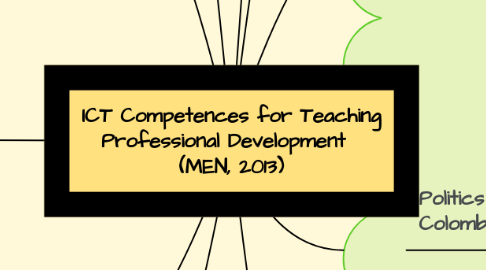
1. Objectives
1.1. To prepare teachers for:
1.1.1. 1. Contibuting to the educative quality through the transformations on pedagogical practices by including ICT tools for enriching the students' learning. 2. Being able to adopt strategies for guiding their students in the use of ICT as tools that provide access to different knowledges, and as a resource for transforming positively their realities. 3. Promoving the educative institutions' tranformations into learning organizations based on the strengthening of academic, administrative and communal managements.
2. Principles
2.1. Appropriateness
2.2. Practic
2.3. Located
2.4. Collaborative
2.5. Inspirational
3. Competences
3.1. Technological
3.1.1. Ability to select and use in a responsible, efficient and pertinent way the ICT tools.
3.2. Comunicative
3.2.1. Ability to express onself, stablish contact with people, virtual and audiovisual spaces through different ways and languages.
3.3. Management
3.3.1. Ability to use ICT tools in the educative processes of planation, orgnization, administration and evaluation ; as much in the pedagogical practices as in the institutional development..
3.4. Pedagogical
3.4.1. Ability to use ICT tools to strengthen teaching and learning processes, by recognizing the importance of these tools for the global students' education and for his/her own professional development.
3.5. Investigative
3.5.1. Ability to use ICT tools for the transformation and creation of new knowledge.
4. Levels of Complexity
4.1. Explotation
4.1.1. It allows for bringing new knowlwdge closer that constitudes a possibility to gain access to new conceptual states.
4.2. Integration
4.2.1. It is related to the use of the knowledge adquired before for the resolution of problems in different contexts.
4.3. Innovation
4.3.1. It emphasizes the creation of different exercises and activities that allow for going beyond the learned knowledge and to imagine new actions and explanations.
5. Orientations
5.1. Teachers
5.2. Teachers' Directors
5.3. Secretaries of Education
5.4. Program Designers
6. Why ICT In teaching process?
6.1. Provide equity
6.2. Increase educactive opportunities
6.3. Democratize Knowledge
6.4. Benefit the ways of learning
7. Politics of Innovation in Colombian Education
7.1. Chronologicallly, from 1984 there have been some significant decrees, meetings and fora that support the educative innovations in Colombia.
7.2. Plan "Política Educativa para la Prosperidad"
7.2.1. *Emphasizes on using ICT tools for teaching. *Educate teachers in the use of ICT tools. *Adjust the syllabi of the educative institutions to implement ICT tools in class.
7.3. Goals
7.3.1. *Educate teachers with the appropriate technological competences for teaching the new generations. *Offert a permanent education on ITC tools. *Equip all institutions with technological devices. *Improve Colombia's competitivity. *Improve Education's quality in all levels. *Strengthen the quality of teaching practices and the PEI renovations *Educate citizens that can be able to meet the actual demands. *Promote the investigation and the educative projects. *Learn to make incursions in some Mass Media.
8. Innovation, What does it mean?
8.1. Innovate means to think critically. It also means to deal with different problems from different perspectives, to create participative contexts, to equip several spaces where the relationship between teacher-student can be stablished, and to improve teaching enviroments' conditions.
9. Roles
9.1. ICT
9.1.1. Allow for the development of students' crtical, autonomous and creative thinking through collaborative work.
9.1.1.1. Question: What is possible to do today with ICT tools that after was almost impossible?
9.2. Teachers
9.2.1. They are in charge of making innovative environments by selecting the strategies and the appropriated ICT tools in order to stablish collaborative relationships among their students.
9.2.1.1. Questions: What are my studients learning? Is their learning useful? Is important what they are learning for their lives?

